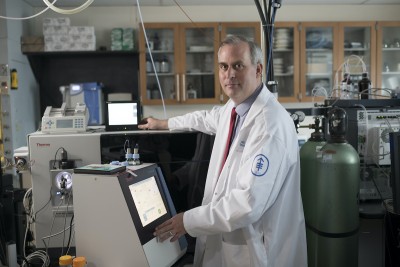
At Memorial Sloan Kettering Cancer Center, our doctors are working to improve the understanding and treatment of neuroendocrine tumors of the gastrointestinal system. Neuroendocrine tumors act quite differently — and, as a result, are managed differently — than other types of tumors. Making an accurate diagnosis before treatment begins is crucial to ensuring the best outcome for patients with these uncommon tumors.
Our neuroendocrine tumor experts — a team that includes medical oncologists, gastroenterologists, gastrointestinal cancer surgeons, endocrinologists, pathologists, and other specialists — have the experience needed to evaluate neuroendocrine tumors and select the appropriate treatment plan for each patient. The team treats hundreds of patients with neuroendocrine tumors each year.
Advanced Imaging Technology
Gastrointestinal neuroendocrine tumors are often difficult to diagnose. Many of these tumors do not cause noticeable symptoms and are discovered only through imaging studies performed for an unrelated health issue. Others may cause symptoms that are not specific to neuroendocrine tumors, which can delay diagnosis.
Doctors at Memorial Sloan Kettering use advanced CT scans, MRI, and nuclear imaging techniques to identify neuroendocrine tumors. These imaging studies, combined with a number of sophisticated laboratory tests, help our doctors distinguish between tumors that are localized and those that have, or have the potential to, spread (metastasize) to another area of the body.
Our Treatment Approach
Our doctors consider a variety of factors — such as the size and location of the tumor, the appearance of the tumor cells under the microscope, whether it has spread, and the patient’s overall health — in developing an individualized treatment plan for patients diagnosed with a gastrointestinal neuroendocrine tumor.
Surgery is the primary treatment for many neuroendocrine tumors, and offers the best chance for a cure. The surgical approach depends on the type of tumor, its location, size, and whether it has spread to nearby lymph nodes or distant organs. Surgery may be recommended even when the tumor has spread to other organs, such as the liver.
However, for some types of neuroendocrine tumors, surgery may not be the optimal treatment. Our doctors are experienced in identifying patients who are candidates for other treatments such as chemotherapy, liver tumor embolization, radiation therapy, hormone therapy, and radiolabeled therapies.
Our Pathology Expertise
Our pathologists are specially trained to identify subtle clues that indicate whether a tumor contains slow-growing or rapidly dividing cells. Understanding these differences can have an important influence on the type of treatment selected for neuroendocrine tumors.
Understanding Risk Factors
Little is known about what causes neuroendocrine tumors. Improving our understanding of the risk factors for developing neuroendocrine tumors could lead to more targeted treatments. Memorial Sloan Kettering’s gastrointestinal neuroendocrine tumor experts have created a tumor registry in partnership with the Neuroendocrine Tumor Biospecimen Consortium, a group of cancer centers working to identify markers for the disease and to unravel the mechanisms that cause the development and progression of neuroendocrine tumors.
Our researchers use sophisticated techniques such as microarrays, which analyze thousands of DNA sequences at once, and polymerase chain reaction (PCR), which generates millions of copies of a particular DNA sequence, to identify genes and certain proteins involved in the progression of neuroendocrine tumors. Results from this research also may be used to identify new therapeutic approaches.
Focus on the Patient
Communication with patients and caregivers is an important priority at Memorial Sloan Kettering. We believe that treating the whole person, not just the disease, is best for patients and family members. Memorial Sloan Kettering offers a broad range of emotional support programs designed to help patients and family members cope with the range of issues related to life during and after cancer treatment. For more information about the services we offer, please visit the Follow-Up Care and Support section.
We’re available 24 hours a day, 7 days a week



